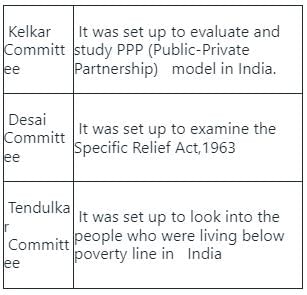MCQ Test: Important Committees - 1 - Bank Exams MCQ
15 Questions MCQ Test General Awareness & Knowledge - MCQ Test: Important Committees - 1
The first Chairman of Disinvestment Commission was ________.
Central Vigilance Commission was set up on the recommendations of:
| 1 Crore+ students have signed up on EduRev. Have you? Download the App |
Which commission suggested that jobs in the Central Government should be reserved for the 'Other Backward Classes' (OBC)?
Which committee has recommended change in the structure and ecosystem in the Indian cricket board?
Which of the following commissions was appointed by the Janata Dal government to investigate the circumstances of the 1975 Emergency?
The Regional Rural Banks were established on the recommendations of the ______ on Rural Credit.
Which Committee's recommendations are being followed for estimating Poverty Line in India?
Which committee was appointed to look into forming of Telangana as a new state?
The Acworth Committee was a British committee that was set to investigate the financial management of the Indian Railways. Which of the following was NOT one of the committee's recommendations?
For suggesting reforms in the micro finance sector, which committee was constituted?
The Punchhi Commission was set up to look into the _______ of the Indian government.
Rangarajan Committee was related to which of the following?
Amongst the following, which committee is not associated with the electoral reforms in India?
|
390 videos|545 docs|149 tests
|
|
390 videos|545 docs|149 tests
|


















